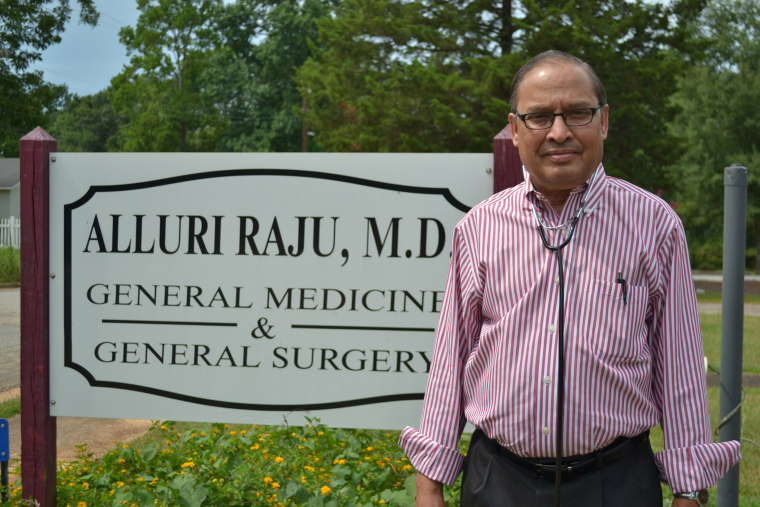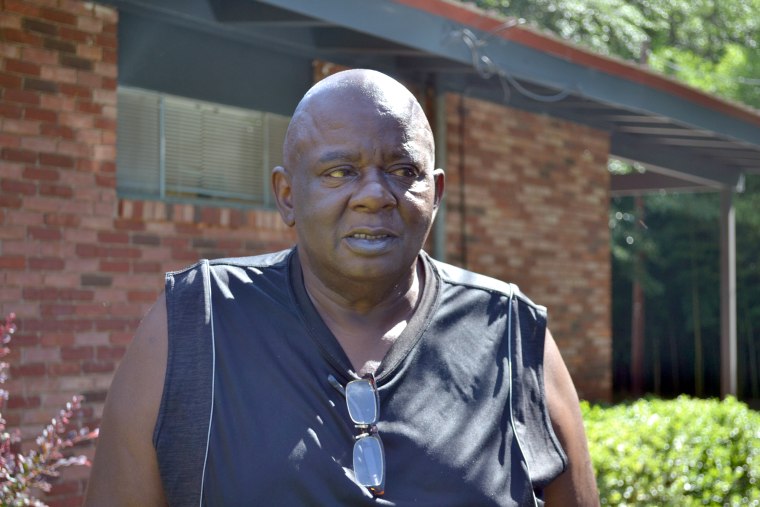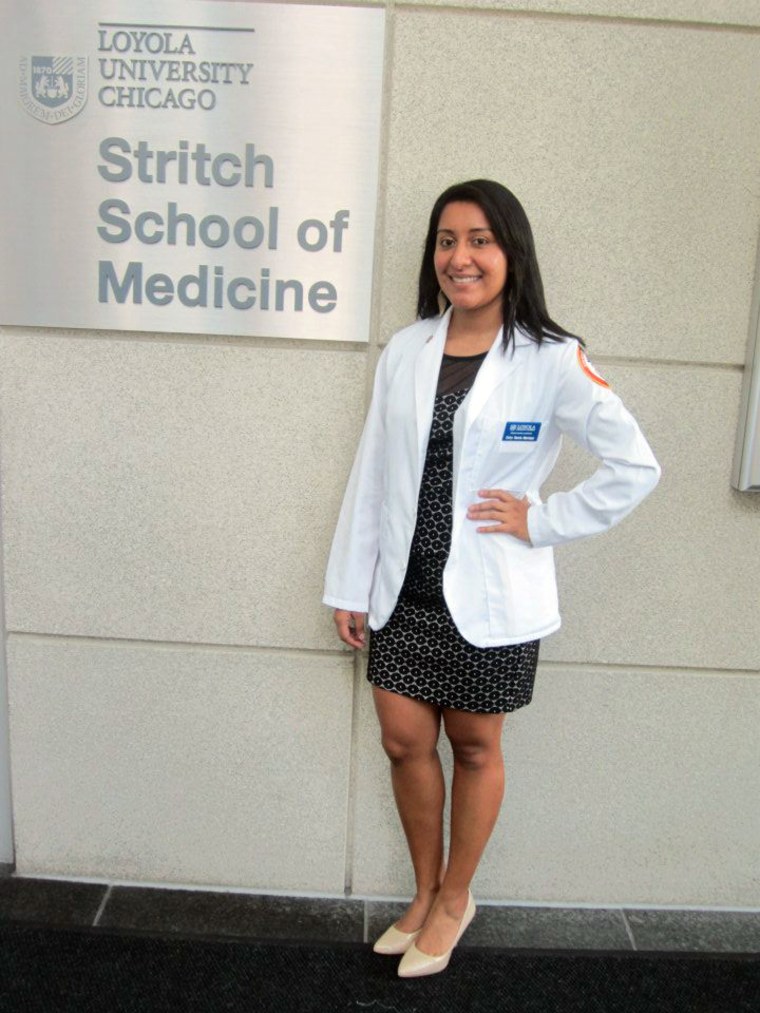ATLANTA — Dr. Alluri Raju, a native of India, vividly remembers how his ethnicity prompted concern and discrimination in the southwest Georgia town of Richland. Doctors there hesitated to grant the family practitioner and general surgeon privileges to the local hospital when he arrived in 1981.

"I guess they wanted to cut me off so that I wouldn't be a competitor,"he recalled.
Yet, in the 37 years Raju has been practicing in Richland during which more than 20 doctors have come and gone, he's the only physician left — not just in Richland, but in all of Stewart County and neighboring Webster County, an area roughly half the size of Rhode Island with a population of more than 8,000.
"Today, I'm it," he said. And his patients, he said, treat him with respect — and not as a foreigner.
Yet President Donald Trump’s focus on securing U.S. borders and restricting immigration — and the bitter arguments between the national political parties on the issue during midterm campaigns — have sown concerns about opportunities for foreign-born doctors.
Many of these doctors, like Raju, work in rural areas that are desperate to attract medical professionals. Yet those areas are often reliable supporters of Trump and his strict immigration policies. A recent national poll found that immigration is the top concern for Republican voters.
Stories like Raju's are the common thread for many immigrant doctors in the United States.
The American Medical Association said that, as of last year, 18 percent of practicing physicians and medical residents in the U.S. in patient care were born in other countries.
Some health care experts say Trump’s tough stance could make it harder for rural areas such as Richland to relieve critical physician shortages.
Raju’s patients say they don’t see any problem in seeking care from an immigrant. Raju has been treating Willie Hawkins, a retired road worker, for 30 years, as well as his mother and his sister.

Sometimes, Hawkins said with a smile, he has to ask the nurse what the doctor just said.
"You know, he talks a little funny," said Hawkins, 66. "But who cares?"
Foreign-born doctors are vital to the national health system. The U.S. is grappling with a doctor shortage that’s expected to grow to as many as 120,000 physicians by 2030, according to the Association of American Medical Colleges.
Even now, primary care doctors are relatively scarce in certain areas of the country, including parts of Georgia.
These immigrants help fill some of the gaps, especially in primary care, said Dr. William Salazar of Augusta University’s Medical College of Georgia, who came to the U.S. from Colombia.
“Foreign-born doctors go to places no one wants to go,” said Dr. Gulshan Harjee, a Tanzanian-born physician who co-founded the Clarkston Community Health Center, a free clinic serving mainly immigrants and refugees in metro Atlanta.
Patients’ Bias
Several foreign-born doctors here recalled awkward interactions with patients, occasionally experiencing bias.
“When they think you’re different, they think you’re not as smart, and think they won’t understand what you’re saying,” said Salazar. “You develop skills to overcome that.’’
But patients overall are getting used to people from other countries, he added.
Saeed Raees, a pharmacist originally from Pakistan who co-founded the Clarkston clinic, said that “you’ll run into a small minority who don’t want to be seen by a foreign-born doctor or a Muslim doctor.”
Physicians from predominantly Muslim countries face increased pressure after the Trump administration tightened its visa and immigration policies. Several doctors said that their visa applications take longer than before or are on hold, and re-entry into the U.S. after traveling was difficult.
There is also acceptance.
Dr. Buthena Nagi, a native of Libya, is employed as a hospitalist at Navicent Health in Macon. Nagi, 40, completed her residency at Morehouse School of Medicine in Atlanta in 2015.
Nagi, 40, wears a hijab — a traditional head covering for many Muslim women — with her scrubs, and sometimes patients and colleagues ask her about it.
"I then explain that this is part of my religion," she said. "And once the dialogue kicks in, the fear dies down, and people seem to understand that I'm not an alien from outer space.”
Opportunity Lost

At age 7, Belsy Garcia Manrique left her home in Guatemala with her mother and sister to meet her father, Felix, who had come to the U.S. two years earlier seeking political asylum. He was living in Georgia.
For many years, she dreamed of being a doctor. U.S. immigration policy, however, blocked her path to medical school. She was not a legal resident. Most states, including Georgia, prevented undocumented immigrant children like Garcia Manrique from qualifying for in-state tuition at public universities.
But President Barack Obama created the Deferred Action for Childhood Arrivals program six years ago. DACA offered more than 800,000 undocumented immigrants brought to the U.S. by their parents a chance to stay without fear of deportation.
Garcia Manrique was accepted to the Stritch School of Medicine at Loyola University Chicago, the first medical school to accept DACA students.
Trump rescinded DACA, a move that has become the subject of ongoing legal and political battles. If his policy stands, Garcia Manrique won’t be allowed to renew her work permit.
She is applying for a residency program to train in family medicine. Only two Georgia medical programs — at Emory University and Morehouse College — said they would consider a DACA recipient. She applied to both.
Of her 50 applications, Garcia Manrique received interview offers from nearly a dozen programs. She hasn’t heard from the ones in Georgia.
And these days she isn’t sure if the Georgia she knew, and the Georgia she loved, is a place where she’d feel welcome.
“After a certain time of being looked down upon, being told 'no,' going the extra mile to get the same benefits, you get tired of that,” Garcia Manrique said.
Kaiser Health News is a nonprofit news service covering health issues. It is an editorially independent program of the Kaiser Family Foundation that is not affiliated with Kaiser Permanente.

